
Kingdom Come: Deliverance Review
Not often does the first project from a new studio tackle the open-world RPG genre, but that's what Warhorse Studios decided to pursue with Kingdom Come: Deliverance. It's certainly an ambitious project from an unproven team, but the concept is an interesting one. When it was originally pitched on Kickstarter back in 2014, the game's realism and a level of historical accuracy became the center point of focus. Not only is the game free from fantasy elements like magic and dragons, but it also aims to portray its setting in a period-accurate manner - at least to some extent.
Kingdom Come: Deliverance takes place in a ~10 km region of Bohemia in the year 1403. The player is put into the shoes of Henry, the son of a blacksmith who lives a mundane life in the mining town of Skalitz. After the opening prologue section of the game, Skalitz is raided by King Sigismund of Hungary and Henry's parents are murdered during the invasion. Henry soon finds himself not only on a quest to avenge his parents, but also caught up in a much larger conflict regarding the fate of the warring kingdoms.
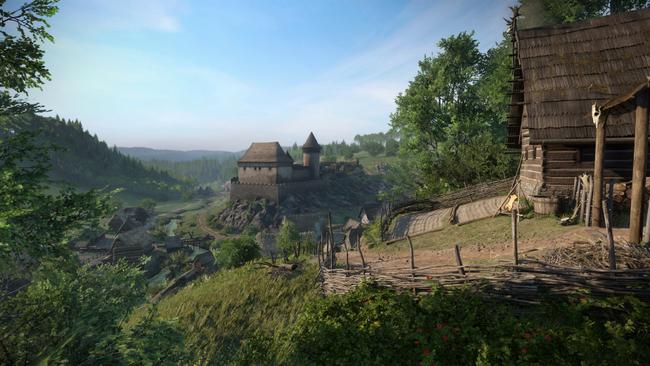
At its core, Deliverance is a first-person open-world RPG that resembles something like an Elder Scrolls game (without the fantasy). You have the main questline to follow to progress the story, but numerous side activities and quests are available throughout the world. You can decide to proceed through the storyline or just explore the map and see what you can find in the countryside.
It's important to remember that Kingdom Come: Deliverance is an RPG through-and-through, and the initial learning curve can be steep. Numbers dictate everything in the game, from how much Henry can carry to how fresh an apple in his inventory is ... everything plays prisoner to numbers. Starting out, Henry sucks at just about everything. He's terrible at wielding a sword, can barely steady a bow, struggles with lockpicking, and has no charisma to persuade anybody. Without the proper numbers in the game's many stats parameters, you are going to find yourself struggling with any of these tasks - both combat and side activities.
The player is forced to start slow, and you have to dedicate some time to "practicing" before Henry starts to get adept at the game's many different systems. Take on cruddy street bandits first, and eventually you'll be strong enough to take on more skilled enemies. Only try pickpocketing from sleeping NPCs to start out, and eventually you'll be good enough to pickpocket from guards in the middle of the day. Struggle with bows longs enough and you'll eventually be able to land headshots with (some) ease. You can expect to spend several hours as a wimpy peasant before Henry really starts to grasp the various statlines.
Kingdom Come: Deliverance has several small systems in place that help to simulate Henry's adventure in 15th century Bohemia. The game has a day/night cycle with both 'hunger' and 'energy' systems in play, so you have to stay on top of these meters throughout your playthrough. Other sorts of 'minigames' also come into play to bolster the simulation aspects of the RPG.
Lockpicking, for example, requires the player to dexterously move an icon on the interface while it rotates in order to break a lock. Crafting potions requires mixing ingredients into a cauldron while following precise instructions like how long to boil the solution. Henry's sword can be sharpened at a grindstone. You also have to keep track of your clothing/armor's durability and cleanliness, which is important not only in battle but also affects Henry's charisma when speaking to anyone.
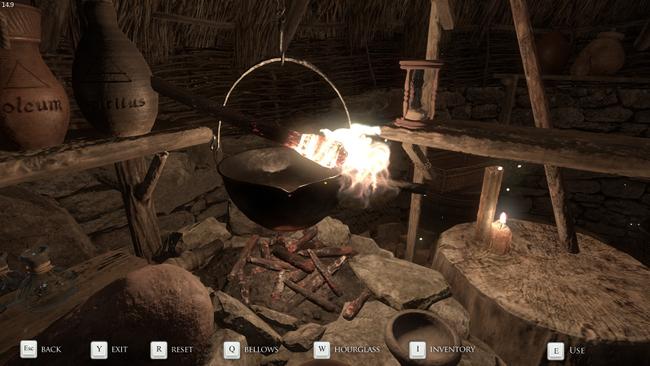
These attempts at realism also lead to one of the more controversial systems KCD has to offer: how saving works. Saves basically come in four forms. You can save by sleeping at a tavern or mill, or the game auto-saves for you after key quest progression. You can also save anywhere using a consumable item known as a Saviour Schnapps. Finally, a recent patch offers 'suspend saves', which essentially offer the option to Save & Quit, and then resume where they left off, although the save file is then removed.
Personally, I got used to the save system fairly readily. Every major town has a bed you can use to save, so I found myself just fast-traveling to the nearest one when I needed to, which takes about 30 seconds. Saviour Schnapps also become easily obtained by mid-game, and I never felt any sort of scarcity to their availability if I needed to save away from a tavern. This save system was put into place in an attempt to avoid players 'save scumming' at every possible opportunity, avoiding bad choices or other consequences. No matter how you look at it, it is an intentional limitation on the player, and you have to learn how to work with it ... or work around it if you are a PC player. An unofficial mod already exists for the PC for those who simply want to save whenever they want.
While discussion around the game often touts realism, there are still several accommodations in place that allow for some convenience despite, well, not being realistic at all. Once you get a horse to call your own, you can then call your horse to your person at any time - you don't have to keep track of where your horse is or anything like that. As long as you are outdoors, just press a button and your steed will magically appear right next to you.
Additionally, your horse can hold much more than Henry can in terms of items and equipment, and you can transfer inventory between Henry and his horse at any time. Even when I found myself pillaging the inner halls of a monastery, I could transfer loot to my horse at the click of a button.
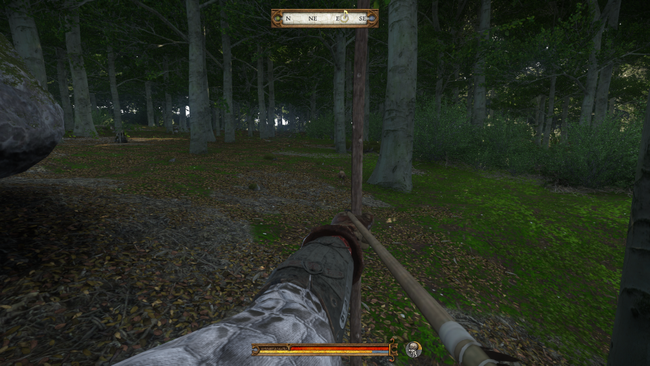
Also, you can stash as many items as you want in a chest at the mill which becomes your 'home base' of sorts. Then, when you go to any tavern in any city in the game, you can access the same chest with all the same items you put into it. There is also a menu option to skip time whenever you want, so you can more easily access quests at certain times.
In trying to consider all the ways Kingdom Come: Deliverance tries to incorporate 'realism' into its gameplay structure, I think it does a pretty good job at it. Yes, some of the systems are there to inconvenience the player, at least a little bit. You aren't allowed to just roam anywhere at any time doing whatever you want, you have to stay on top of your armor state, your hunger/energy state, among other typical things like making sure you have a way to heal yourself and room for loot in your inventory.
Different perks are available as you progress through the game that lighten up these restrictions, such as Insomniac, which makes Henry's energy deplete much slower than usual. One of the most useful perks allows Henry to maintain his hunger/energy as he stands still, which makes manipulating time much less of a burden (although it clearly is not realistic at all). The game not only gets easier as you progress because you are getting accustomed to it, but also because of the ways you can effectively lessen some of the ways the game tries to inconvenience you.
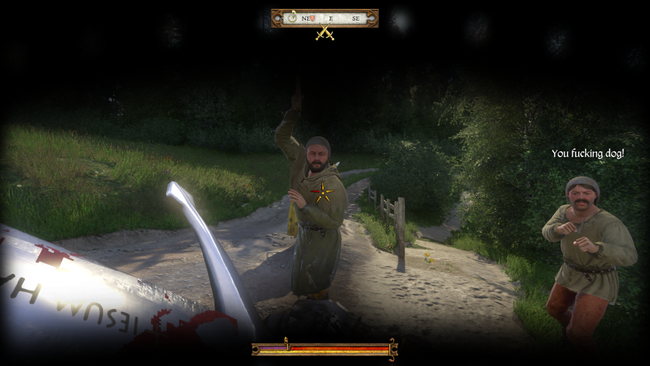
Combat, like everything else in the game, is done from the first-person perspective, and I'll be honest, it's a little bit tricky to critique. You essentially angle your weapon in one of six directions and swing towards your opponent, and then you can chain swings together with appropriate timing while changing up direction. Of course, this all runs off of a stamina meter, so you can't just hack away endlessly. Stamina is also used in blocking attacks as well, so you always want to keep some stamina in your gauge else you might find yourself unable to defend yourself. You eventually get combos with certain weapons, which require both precise timing and proper direction in Henry's swings.
All-in-all combat feels a bit clumsy, a bit claustrophobic, and some of the later skirmishes in the game can be downright chaotic. Sometimes, formidable opponents can take a couple minutes on their own to take down. If you are wearing a heavy helmet, your viewing angle is partially blocked, trying to emulate how wearing a helmet might actually feel. It's not stylish. It's not fluid.
But despite all this, it feels somehow appropriate. I wasn't alive 600 years ago but I doubt warfare at this time was clean or orderly. Henry doesn't have superhuman abilities to take out foes in a flashy, tidy manner. The only way you can take out your foes is to wear them out before they wear you out. Whether this sounds like something you enjoy might be completely up to player preference, but don't expect extravagant, smooth battles.
Combat balance can be a little bit odd, too. Early on in the game, it feels like everybody can kill Henry easily, but by the end, you feel like a walking demigod, swatting bandits away like flies. While this sort of progression might feel more at home in a fantasy game, it seems a little out of place in a game that surrounds itself so strongly with attempts to be grounded. Warhorse has already tweaked this sort of combat balance to some extent in post-launch patches, and perhaps they'll continue to do so.
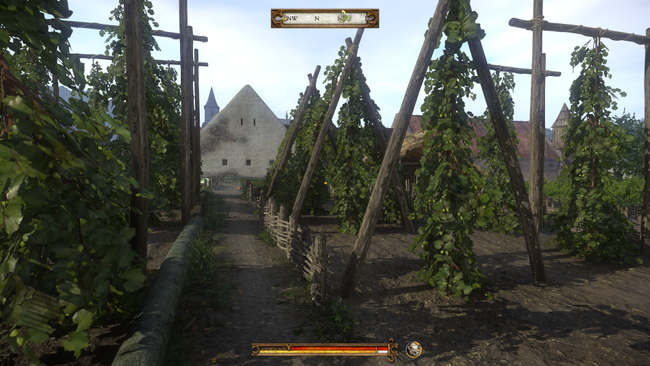
When it comes to quests, Kingdom Come: Deliverance is fairly multi-faceted. Many can be approached in a variety of ways, and depending on how you carry through them and which NPCs Henry speaks with and in which order, these quests can lead to distinct outcomes. Sometimes quests also carry a sort of time-sensitivity to them as well, where Henry is expected to appear in some designated spot at a specific time. I personally went out of my way to not miss any time-limited quest objective, but this is yet another way KCD attempts to arm itself with realism. You can't always progress at your own pace because the NPCs in the game are not restricted by the player's actions.
However, this number of permutations in quest completion lead to many technical problems, such as cutscenes not triggering, broken dialogue options, and even quest characters who were supposed to be dead magically reappearing, breaking quest progression. I found myself having to redo questlines several times, wasting hours, trying to find some sort of 'critical path' that needed to be followed in order to complete the quest without breaking the game. This, as you might expect, was incredibly frustrating.
I actually decided to stop my original playthrough of the game partway through due to the numerous quest bugs I encountered, among other performance oddities. One reason why I took time to write this review is I wanted to give Warhorse Studios a little bit of time to address some of these glaring bugs I encountered with the pre-release and launch versions of the game. Not that I wanted to dismiss technical glitches outright, but I didn't want my experiences to be void within weeks of publication if Warhorse was able to iron the game out quickly. As of this writing, the game is on version 1.3.3, which included many fixes to problems that plagued launch players, such as overly difficult lockpicking and quest fixes.
Indeed, this patch did fix some of the bugged quests I was stuck on, but I was a bit surprised how many bugs I ran into still after the patch. I still had to redo two separate late-game events because of cutscenes not activating as they should. I expect Warhorse will eventually iron out these issues, and some jankyness might be expected in such a large game, but it's still certainly not ideal, and you almost have to learn to accept it as you play.
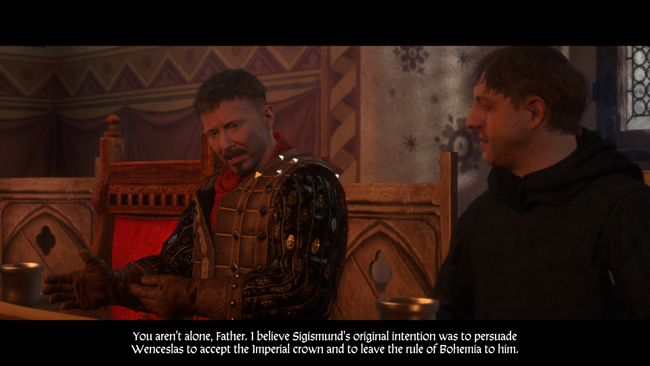
I found myself actually quite impressed by the cinematic direction, dialogue, and voice-acting that Kingdom Come: Deliverance has to offer. Coming from a new unproven developer, I expected the performance here to be a lot more amateur than it is. Cutscene direction can be impressive at times and solid voice performances all around bolster the dialogue. Henry, in particular, is a bit of a lovable dork with an incredibly earnest voice performance, but the role is sold well. He's appropriately angry when he needs to be, mopey when he needs to be, but is always believable as a blacksmith's son thrown into a conflict he originally had little to do with.
The storyline itself, despite being based on real events, is a bit underwhelming - just a bit. Throughout most of the storyline, the opponents you face off against are either faceless bandits or villains who have little motivation other than conquest and plunder. That's not to say that the plot doesn't have its good character moments and memorable events - because it does - more that players shouldn't expect some epic grand storyline you might find in some high fantasy novel.
Some side story content in the game can also come across a bit oddly. Early on in the game, Henry is saved by his neighbor in Skalitz, Theresa, and a side quest opens up where Henry and Theresa's relationship can unfold. After a series of events between the two, they eventually confess to each other and make out in a barn. After this, the quest completes. The odd part really comes in when Henry speaks to Theresa again and ... she has reverted back to her original default dialogue options, as if nothing at all has happened. While this might just be a factor of the developer running out of time to incorporate some sort of post-quest interaction, it feels strange that the ultimate reward is to see your character have sex, and then nothing else.
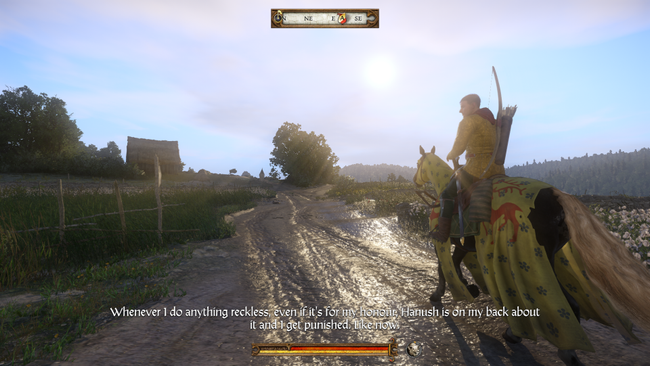
It's also worth remembering that Kingdom Come: Deliverance only takes place in a small section of a much larger conflict involving multiple parties across a much larger region of Europe. This leads to several occasions where the cast of characters within Kingdom Come: Deliverance speak to each other about people and places you, the player, don't actually get to see. Due to how the game portrays conflicts of nations through the eyes of a single protagonist, parts of the narrative are "told" through conversation and not "shown" through cinematics. The dialogue is written well enough that these scenes can still be engaging, but you do actually have to pay attention to what is being said to keep some events and names straight.
The game also ends on a somewhat open-ended note, with some main conflicts presented in the game never reaching a full conclusion. It's not quite clear if this is the ending that Warhorse intended or if they plan to expand upon it in future updates or DLC.
Kingdom Come: Deliverance satisfies that itch if you are looking for something a little different than typical western high fantasy or Japanese style RPGs. It's rough around the edges and some narrative & mechanical quirks don't always hit their mark, but it's still an enjoyable experience if you can put up with a little bit of uneveness.